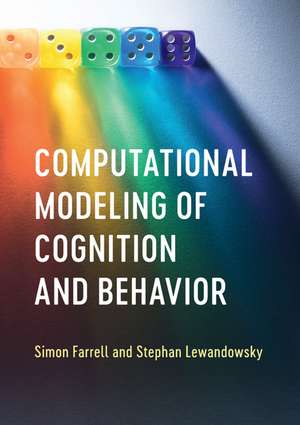Computational Modeling of Cognition and Behavior
Autor Simon Farrell, Stephan Lewandowskyen Limba Engleză Paperback – 21 feb 2018
| Toate formatele și edițiile | Preț | Express |
|---|---|---|
| Paperback (1) | 369.39 lei 6-8 săpt. | |
| Cambridge University Press – 21 feb 2018 | 369.39 lei 6-8 săpt. | |
| Hardback (1) | 929.00 lei 6-8 săpt. | |
| Cambridge University Press – 21 feb 2018 | 929.00 lei 6-8 săpt. |
Preț: 369.39 lei
Nou
Puncte Express: 554
Preț estimativ în valută:
70.69€ • 73.24$ • 58.100£
70.69€ • 73.24$ • 58.100£
Carte tipărită la comandă
Livrare economică 21 martie-04 aprilie
Preluare comenzi: 021 569.72.76
Specificații
ISBN-13: 9781107525610
ISBN-10: 1107525616
Pagini: 482
Ilustrații: 114 b/w illus. 15 tables
Dimensiuni: 173 x 246 x 23 mm
Greutate: 0.95 kg
Editura: Cambridge University Press
Colecția Cambridge University Press
Locul publicării:New York, United States
ISBN-10: 1107525616
Pagini: 482
Ilustrații: 114 b/w illus. 15 tables
Dimensiuni: 173 x 246 x 23 mm
Greutate: 0.95 kg
Editura: Cambridge University Press
Colecția Cambridge University Press
Locul publicării:New York, United States
Cuprins
Preface; Part I. Introduction to Modeling: 1. Introduction; 2. From words to models: building a toolkit; Part II. Parameter Estimation: 3. Basic parameter estimation techniques; 4. Maximum likelihood parameter estimation; 5. Combining information from multiple participants; 6. Bayesian parameter estimation: basic concepts; 7. Bayesian parameter estimation: Monte Carlo methods; 8. Bayesian parameter estimation: the JAGS language; 9. Multilevel or hierarchical modeling; Part III. Model Comparison: 10. Model comparison; 11. Bayesian model comparison using Bayes factors; Part IV. Models in Psychology: 12. Using models in psychology; 13. Neural network models; 14. Models of choice response time; 15. Models in neuroscience; Appendix A: Greek symbols; Appendix B: mathematical terminology; References; Index.
Recenzii
'I shudder to think about the time I could have saved had this book been available earlier. This educational masterpiece presents classic insights, modern methods, concrete examples, and expert advice; it should be required reading for anybody who seeks to understand human cognition and behavior.' Eric-Jan Wagenmakers, Universiteit van Amsterdam
'This timely book is a must-read for every aspiring student of cognitive modeling. It provides a comprehensive and in-depth coverage of the conceptual and practical foundations of computational cognition, for the beginner and the experienced reader alike. The art of applying all major modeling frameworks, including Bayesian, frequentist, and neural networks, is explained in a most lucid and accessible manner.' Jay Myung, Ohio State University
'An extraordinary achievement: the authors guide the reader from simple ideas about the nature of science to detailed, but lucidly explained, computer models of human behaviour. Associated statistical methods are comprehensively discussed. A pleasure to read.' Philip T. Smith, University of Reading
'Farrell and Lewandowsky have succeeded in their ambition of spanning introductory to cutting-edge material. This book, and a willingness to dive in and learn by doing the exercises provided, is all that undergraduate and graduate students, and even established researchers, need to become a cognitive modeller.' Andrew Heathcote, University of Tasmania, Australia
'Whether you are just setting out on your journey into computational modelling or whether you need to update your skills to incorporate newer and more coherent current practices, Farrell and Lewandowsky's book is likely to earn its place on your bookshelf.' Tom Hartley, Quarterly Journal of Experimental Psychology
'This timely book is a must-read for every aspiring student of cognitive modeling. It provides a comprehensive and in-depth coverage of the conceptual and practical foundations of computational cognition, for the beginner and the experienced reader alike. The art of applying all major modeling frameworks, including Bayesian, frequentist, and neural networks, is explained in a most lucid and accessible manner.' Jay Myung, Ohio State University
'An extraordinary achievement: the authors guide the reader from simple ideas about the nature of science to detailed, but lucidly explained, computer models of human behaviour. Associated statistical methods are comprehensively discussed. A pleasure to read.' Philip T. Smith, University of Reading
'Farrell and Lewandowsky have succeeded in their ambition of spanning introductory to cutting-edge material. This book, and a willingness to dive in and learn by doing the exercises provided, is all that undergraduate and graduate students, and even established researchers, need to become a cognitive modeller.' Andrew Heathcote, University of Tasmania, Australia
'Whether you are just setting out on your journey into computational modelling or whether you need to update your skills to incorporate newer and more coherent current practices, Farrell and Lewandowsky's book is likely to earn its place on your bookshelf.' Tom Hartley, Quarterly Journal of Experimental Psychology
Notă biografică
Descriere
This book presents an integrated framework for developing and testing computational models in psychology and related disciplines.
